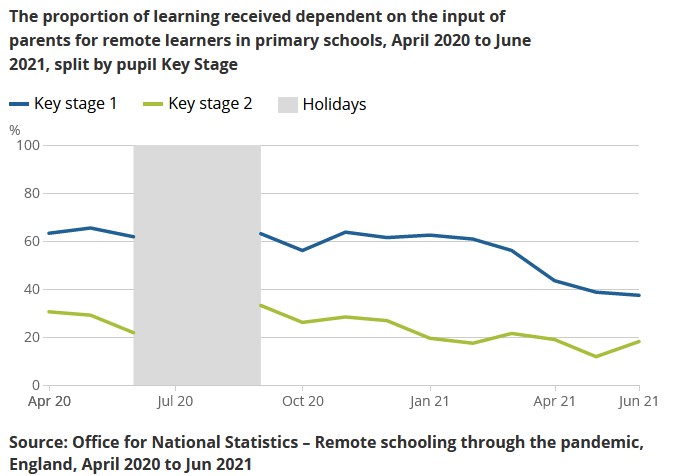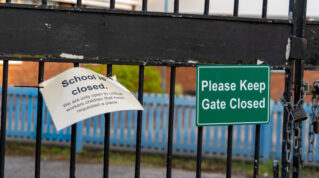Pupils in the poorest areas covered only two-thirds of the material while learning remotely as their peers in the classroom, new figures show.
The gap between online and in-school learning was larger in schools with more deprived pupils than those in wealthier areas.
The data was released as part of Office for National Statistics research into remote learning released today, based on staff surveys via the Teacher Tapp app.
Here is a breakdown of the key findings.
1. Poorer pupils lose out more online
The ONS figures underline the impact on learning of continual disruption from many pupils having to learn online for large spells of the pandemic.
Researchers said the difference in the amount of learning materials covered between remote and in-class learning was “particularly acute” at schools with more disadavantaged pupils.
The gap was at its greatest for all schools at the beginning of the first national lockdown, before improving slightly. Remote learners covered just 55 per cent of material that was covered on site in the poorest areas in April 2020. The figure was 61 per cent in schools in the least deprived areas.
Schools Week analysis of the monthly data shows pupils in the poorest quarter of schools averaged 66 per cent of in-class learning between last April and this June, versus 74 per cent in the wealthiest quarter.
It could reflect more limited access to IT and “lower levels of communication” with pupils in poorer areas, the ONS said.
2. Arts and PE hit hardest by move online
Secondary school data shows “arts including design and technology” has been particularly badly affected by Covid disruption.
The subject group saw only 48 per cent of on-site learning delivered remotely in April 2020, with the proportion edging higher subsequently but only reaching a high of 66 per cent.
By contrast humanities teachers were able to provide at most 84 per cent of in-school learning in February 2021, according to the Teacher Tapp survey.
Both subject areas were more dependent on parental instruction, teachers said. While reliance on parents dropped as the pandemic dragged on, “possibly reflecting teachers’ adaptation to this new teaching medium”, this pattern was not as clear for PE or arts.
3. Primary staff reliant on parents for 60 per cent of learning

The ONS research puts a figure on just how reliant primary staff were on parental involvement to teach remotely.
Around 60 per cent of key stage 1 learning was dependent on parents in the first nine months of the pandemic. It dropped to closer to 40 per cent in more recent months, however.
At key stage 2, “parents accounted for between a third and around a fifth of the learning covered”.
“These intuitive results highlight that younger pupils, who are just starting to learn to read, write and use digital media, clearly have much less independent learning potential than pupils a few years older.”
4. ‘Little evidence’ of regional gaps
Despite regional divides in levels of both deprivation and Covid disruption across the country, experts found “little evidence here that remote learning has been significantly more successful in any one region than another”.
While most differences were “mostly not statistically significant and may reflect sample variation”, some small gaps were clear.
The south west saw teachers report remote learning being closest to in-class provision, whereas Yorkshire and the north east reported the opposite.
5. Remote learning a ‘partial substitute at best’
Learning remotely is estimated to have been a “closer approximiation” to in-class learning at secondary level, with more material covered and less reliance on parental learning.
“This likely reflects the greater independence of older pupils for whom remote learning is likely to have been more practicable than for many younger primary school pupils.”
But the ONS concludes: “For both groups remote learning was, at best, a partial substitute for in-class learning.”
















Your thoughts